-
 Bitcoin
Bitcoin $118300
-0.58% -
 Ethereum
Ethereum $3825
0.11% -
 XRP
XRP $3.137
-0.71% -
 Tether USDt
Tether USDt $0.9999
-0.01% -
 BNB
BNB $803.9
-3.37% -
 Solana
Solana $181.5
-1.94% -
 USDC
USDC $0.9999
0.01% -
 Dogecoin
Dogecoin $0.2238
-2.51% -
 TRON
TRON $0.3358
2.12% -
 Cardano
Cardano $0.7844
-2.16% -
 Hyperliquid
Hyperliquid $43.31
-1.48% -
 Sui
Sui $3.807
-4.04% -
 Stellar
Stellar $0.4203
-1.96% -
 Chainlink
Chainlink $17.79
-3.00% -
 Bitcoin Cash
Bitcoin Cash $567.8
-1.34% -
 Hedera
Hedera $0.2614
-4.30% -
 Avalanche
Avalanche $24.19
-4.46% -
 Litecoin
Litecoin $109.2
-0.74% -
 UNUS SED LEO
UNUS SED LEO $8.969
-0.01% -
 Toncoin
Toncoin $3.404
3.97% -
 Ethena USDe
Ethena USDe $1.001
-0.01% -
 Shiba Inu
Shiba Inu $0.00001307
-3.19% -
 Uniswap
Uniswap $10.33
-1.23% -
 Polkadot
Polkadot $3.884
-4.06% -
 Monero
Monero $312.9
-1.87% -
 Dai
Dai $1.000
0.01% -
 Bitget Token
Bitget Token $4.537
-2.24% -
 Pepe
Pepe $0.00001156
-3.40% -
 Cronos
Cronos $0.1437
-0.89% -
 Aave
Aave $282.8
-2.77%
Is the OBV indicator reaching a new high but the price not following a volume-price divergence or a power-accumulating breakthrough?
When OBV hits a new high but price lags, it may signal either hidden strength or divergence—confirm with price action and volume trends before trading.
Jul 30, 2025 at 01:07 am
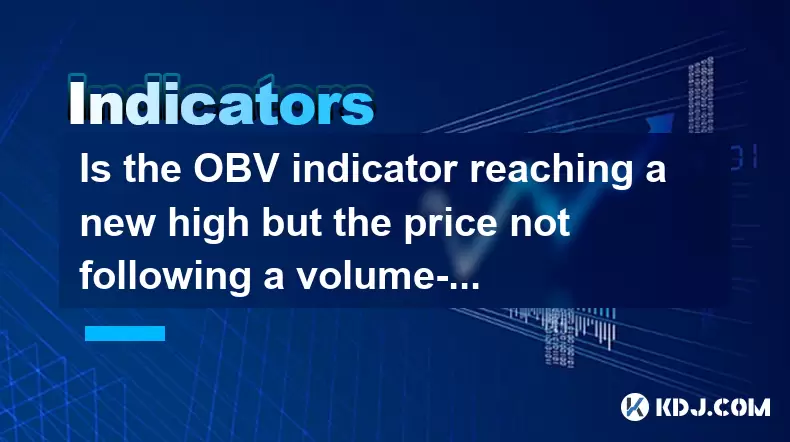
Understanding the OBV Indicator and Its Role in Technical Analysis
The On-Balance Volume (OBV) indicator is a cumulative measure that uses volume flow to predict changes in stock or cryptocurrency prices. Developed by Joseph Granville, OBV adds volume on up days and subtracts volume on down days. When the OBV indicator reaches a new high, it suggests strong buying pressure over time, even if the price hasn't yet followed suit. This dynamic often prompts traders to examine whether this is a volume-price divergence or a potential power-accumulating breakthrough.
The core principle behind OBV is that volume precedes price. A rising OBV indicates accumulation—smart money may be quietly buying—while a falling OBV signals distribution. In the context of cryptocurrency markets, where volatility and sentiment play significant roles, OBV becomes a crucial tool for identifying underlying strength or weakness that isn't immediately visible in price action.
What Constitutes a Volume-Price Divergence?
A volume-price divergence occurs when the OBV makes a new high while the price fails to confirm with a corresponding new high. This scenario can be interpreted as a warning sign. Despite increasing volume on up days, the price is unable to break past previous resistance levels. This disconnect suggests that although buying volume is rising, the market lacks the conviction to push prices higher.
For example, in a cryptocurrency chart:
- The OBV line climbs to a new peak, indicating sustained buying activity.
- However, the price remains below a prior resistance level or forms a lower high.
- This mismatch implies that demand is not translating into upward price momentum.
Traders should closely monitor candlestick patterns and order book depth during such divergence. A divergence does not automatically mean a reversal is imminent, but it does signal that the current trend may be losing momentum. It is critical to analyze whether large buy orders are being absorbed without price advancement, which could indicate hidden selling pressure.
Recognizing a Power-Accumulating Breakthrough
Conversely, when the OBV reaches a new high and the price is consolidating or forming a base, this may indicate a power-accumulating breakthrough in the making. Accumulation refers to a phase where institutional or informed traders are steadily acquiring assets without triggering significant price moves. This stealthy buildup often precedes a strong upward breakout.
Key characteristics of power accumulation include:
- OBV trending upward over several weeks or months.
- Price moving sideways within a tight range.
- Declining volatility, often seen in tightening Bollinger Bands.
- Low to moderate volume during consolidation, with occasional spikes.
When a breakout finally occurs, it is typically accompanied by a surge in volume and a sharp price increase. The prior rise in OBV serves as confirmation that the breakout is backed by real volume, not just speculative noise. In cryptocurrency trading, such breakouts are common after extended periods of consolidation in altcoins following Bitcoin halving events.
How to Confirm the OBV Signal with Additional Indicators
To avoid false signals, traders should combine OBV analysis with other technical tools. One effective method is using moving averages on the OBV line itself. A rising OBV that stays above its 20-period or 50-period moving average reinforces the bullish case.
Another approach is to overlay price trendlines with OBV trendlines:
- Draw a trendline connecting the lows of the OBV.
- Compare it with the price trendline.
- If OBV breaks out of its trendline earlier than price, it may foreshadow a price breakout.
Additionally, Relative Strength Index (RSI) can help determine whether the market is overbought or oversold during the divergence. If RSI is in neutral territory (40–60) while OBV rises, it increases the likelihood of a genuine accumulation phase rather than exhaustion.
Volume profile analysis is also useful in crypto markets. Look for high-volume nodes at support levels where price has repeatedly bounced. If OBV is rising while price hovers near such a node, it strengthens the case for accumulation.
Step-by-Step Guide to Analyzing OBV Divergence in Crypto Charts
To perform a thorough OBV analysis on a cryptocurrency chart, follow these steps:
- Open a charting platform such as TradingView and load a major cryptocurrency pair like BTC/USDT.
- Apply the OBV indicator from the indicators menu.
- Adjust the chart to a daily or 4-hour timeframe for clearer trend identification.
- Identify the most recent price high and compare it with the corresponding OBV value at that time.
- Locate the current OBV high and check whether the price has matched or exceeded its prior peak.
- If OBV is higher but price is lower, mark this as a bearish divergence.
- If OBV and price are both rising together, this confirms trend strength.
- Use drawing tools to connect OBV peaks and troughs, creating a trendline for visual confirmation.
- Cross-verify with order book data on exchanges to see if bid walls are growing during OBV upticks.
This process allows traders to objectively assess whether volume is supporting price action or warning of an impending shift.
Common Misinterpretations of OBV Signals in Volatile Markets
Cryptocurrency markets are prone to sudden spikes and flash crashes, which can distort OBV readings. A single large candle with massive volume can cause OBV to spike, creating a false impression of accumulation. Traders must distinguish between sustainable volume trends and one-off events.
For instance, a whale dumping or buying a large amount of tokens can skew OBV without reflecting broader market sentiment. To filter noise:
- Use volume filters to exclude outliers.
- Compare OBV behavior across multiple timeframes.
- Avoid making decisions based on OBV alone on low-liquidity altcoins.
Also, in range-bound markets, OBV may fluctuate without clear direction. In such cases, waiting for a confirmed breakout with volume is safer than acting on early OBV signals.
Frequently Asked Questions
Can OBV divergence occur in both bullish and bearish directions?
Yes. A bullish divergence happens when price makes a lower low but OBV makes a higher low, indicating weakening selling pressure. A bearish divergence occurs when price makes a higher high but OBV makes a lower high, signaling weakening buying momentum.
How reliable is OBV in low-cap cryptocurrencies?
OBV can be less reliable in low-cap cryptos due to manipulative volume spikes and thin order books. It's advisable to use OBV in conjunction with on-chain data and exchange flow metrics for better accuracy.
Should I trade based solely on OBV signals?
No. OBV should not be used in isolation. It works best when combined with price action analysis, support/resistance levels, and other volume-based indicators like VWAP or volume profile.
What timeframes are best for observing OBV divergences?
Daily and 4-hour charts provide the most reliable OBV signals. Shorter timeframes like 5-minute charts are prone to noise and may generate false divergences due to high-frequency trading activity.
Disclaimer:info@kdj.com
The information provided is not trading advice. kdj.com does not assume any responsibility for any investments made based on the information provided in this article. Cryptocurrencies are highly volatile and it is highly recommended that you invest with caution after thorough research!
If you believe that the content used on this website infringes your copyright, please contact us immediately (info@kdj.com) and we will delete it promptly.
- McLaren's High-Octane Headache: The Piastri, Norris, F1 Battle Heats Up
- 2025-07-30 18:50:12
- Hong Kong Stablecoin Licences: A Cautious Dawn
- 2025-07-30 18:50:12
- Shiba Inu, Dogecoin, Crypto Soar? Meme Coins Face New Challenger!
- 2025-07-30 17:30:12
- UNITE, KuCoin, and the Future of Mobile Gaming: A New York Minute on Web3
- 2025-07-30 16:30:12
- Strategy, Bitcoin, Investment: Riding the Crypto Wave Like a Pro
- 2025-07-30 16:30:12
- JD.com, Jcoin, and Stablecoins: Hong Kong's Regulatory Embrace
- 2025-07-30 16:50:11
Related knowledge
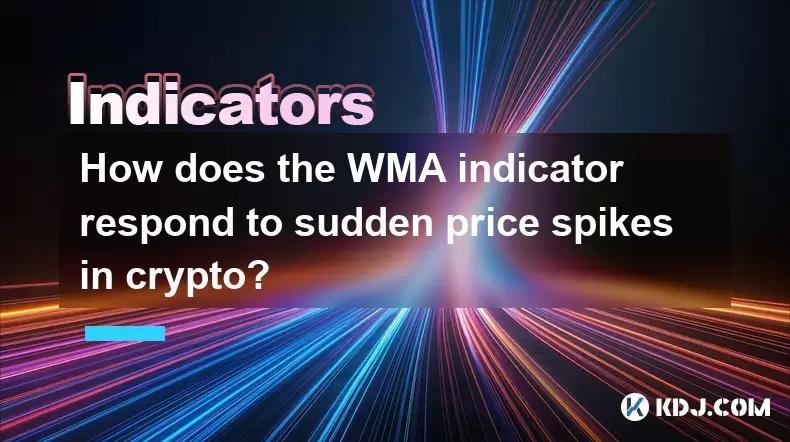
How does the WMA indicator respond to sudden price spikes in crypto?
Jul 30,2025 at 07:28pm
Understanding the WMA Indicator in Cryptocurrency MarketsThe Weighted Moving Average (WMA) is a technical analysis tool widely used in cryptocurrency ...
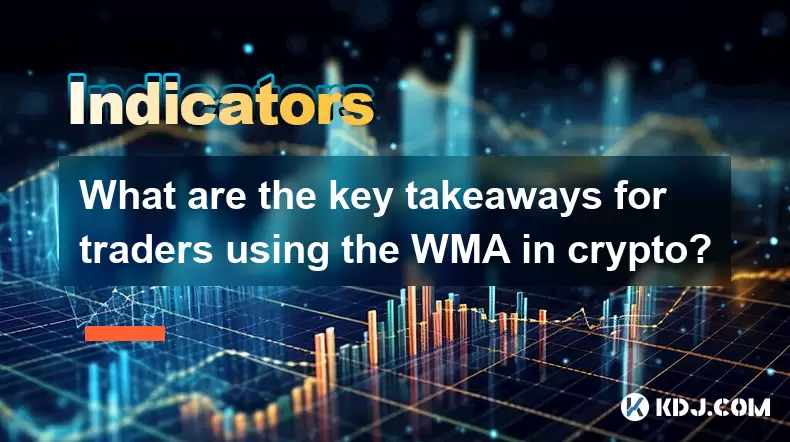
What are the key takeaways for traders using the WMA in crypto?
Jul 30,2025 at 07:15pm
Understanding the Weighted Moving Average (WMA) in Cryptocurrency TradingThe Weighted Moving Average (WMA) is a technical indicator that assigns great...
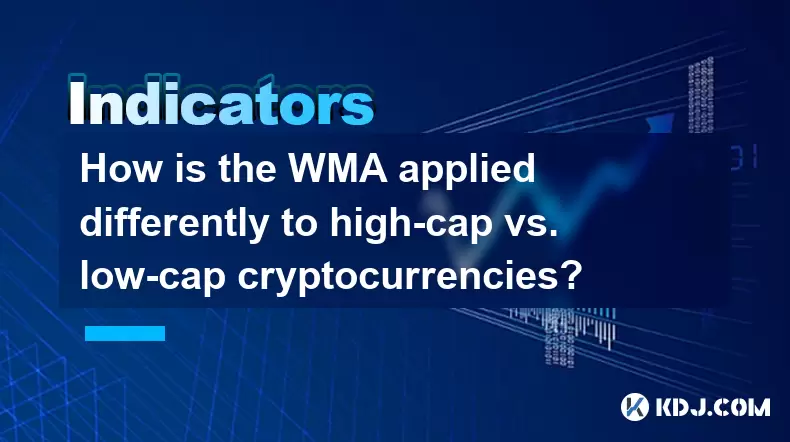
How is the WMA applied differently to high-cap vs. low-cap cryptocurrencies?
Jul 30,2025 at 07:08pm
Understanding the Weighted Moving Average (WMA) in Cryptocurrency AnalysisThe Weighted Moving Average (WMA) is a technical indicator used to analyze p...
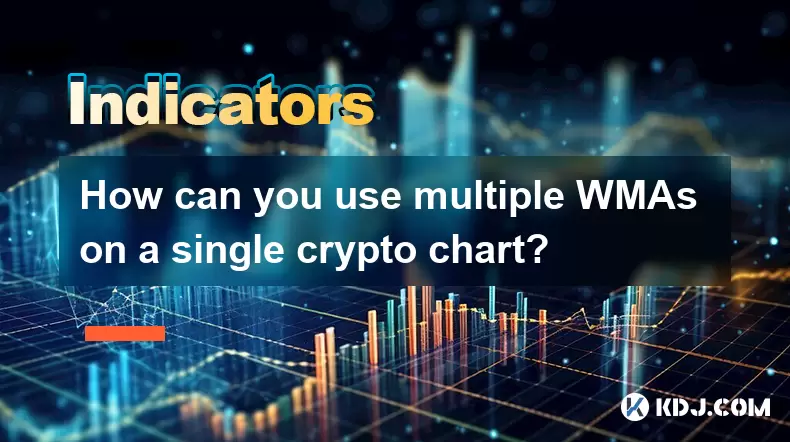
How can you use multiple WMAs on a single crypto chart?
Jul 30,2025 at 06:56pm
Understanding the Role of Private Keys in Cryptocurrency SecurityIn the world of cryptocurrency, private keys are the cornerstone of ownership and con...
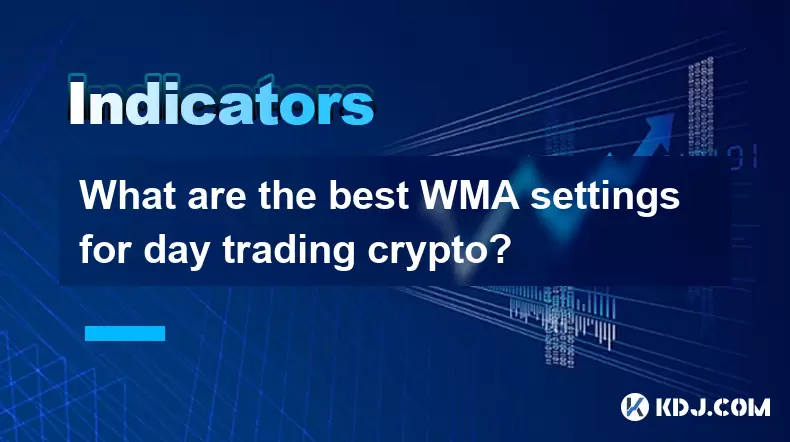
What are the best WMA settings for day trading crypto?
Jul 30,2025 at 03:43pm
Understanding WMA in the Context of Crypto Day TradingThe Weighted Moving Average (WMA) is a technical indicator that assigns greater importance to re...
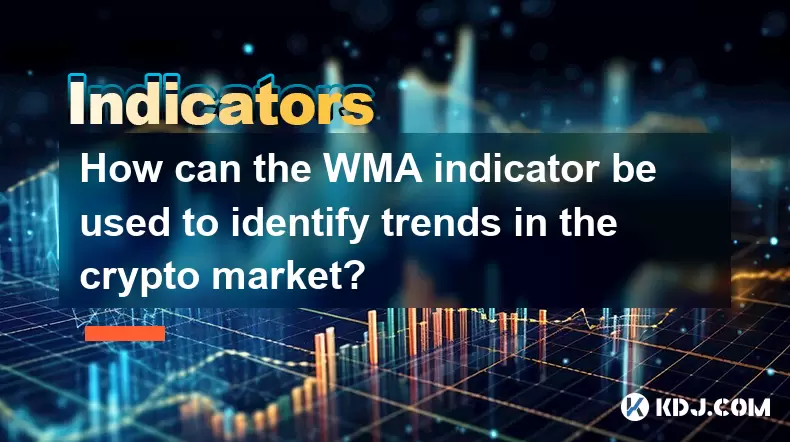
How can the WMA indicator be used to identify trends in the crypto market?
Jul 30,2025 at 04:56pm
Understanding the WMA Indicator in Cryptocurrency TradingThe Weighted Moving Average (WMA) is a technical analysis tool that assigns greater importanc...

How does the WMA indicator respond to sudden price spikes in crypto?
Jul 30,2025 at 07:28pm
Understanding the WMA Indicator in Cryptocurrency MarketsThe Weighted Moving Average (WMA) is a technical analysis tool widely used in cryptocurrency ...

What are the key takeaways for traders using the WMA in crypto?
Jul 30,2025 at 07:15pm
Understanding the Weighted Moving Average (WMA) in Cryptocurrency TradingThe Weighted Moving Average (WMA) is a technical indicator that assigns great...

How is the WMA applied differently to high-cap vs. low-cap cryptocurrencies?
Jul 30,2025 at 07:08pm
Understanding the Weighted Moving Average (WMA) in Cryptocurrency AnalysisThe Weighted Moving Average (WMA) is a technical indicator used to analyze p...

How can you use multiple WMAs on a single crypto chart?
Jul 30,2025 at 06:56pm
Understanding the Role of Private Keys in Cryptocurrency SecurityIn the world of cryptocurrency, private keys are the cornerstone of ownership and con...

What are the best WMA settings for day trading crypto?
Jul 30,2025 at 03:43pm
Understanding WMA in the Context of Crypto Day TradingThe Weighted Moving Average (WMA) is a technical indicator that assigns greater importance to re...

How can the WMA indicator be used to identify trends in the crypto market?
Jul 30,2025 at 04:56pm
Understanding the WMA Indicator in Cryptocurrency TradingThe Weighted Moving Average (WMA) is a technical analysis tool that assigns greater importanc...
See all articles

























































































